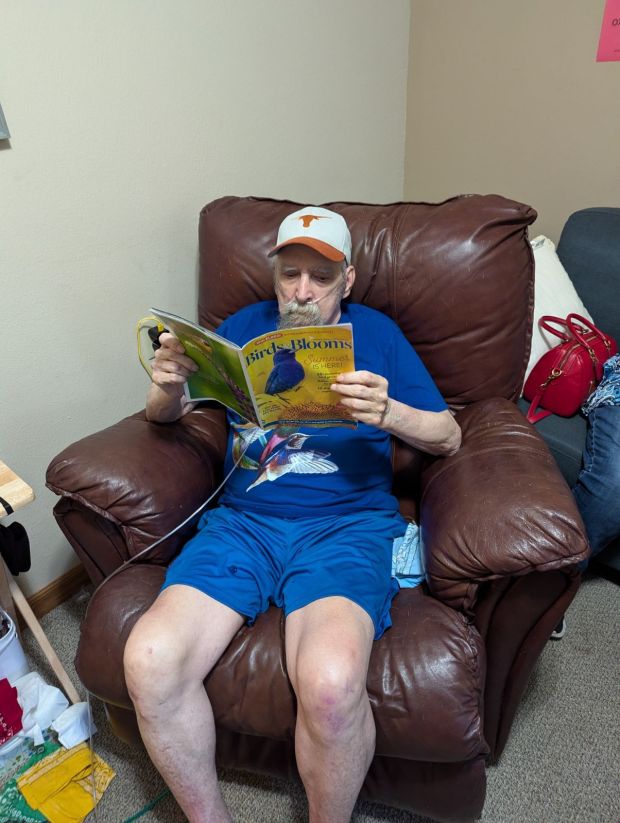Dewey Howell has stopped asking his daughters when he’s going to have to move from the place he’s considered home the last two years — at least, not constantly anymore.
Chatter in the dining room will trigger the question though, his daughter, Leeann Howell, said — chatter that’s been perpetual since a resident read in the Post-Tribune that Virginia Place, an assisted living center, is being sold to Terre Haute-based drug behavioral center-operator Harsha Recovery Center LLC. When he asks, she and her sister Trudy tell the 75-year-old he’s going back to Leeann’s house in Highland, and he won’t have to pay rent anymore.
The explanation works for Dewey Howell, who has dementia that’s all but decimated his short-term memory. But it breaks his daughters’ hearts every time.
“We don’t tell him what’s really happening,” Leeann Howell said. “He just now has started to acknowledge that he broke his back, but even then, if you ask him about it, he says, ‘Well, that’s what they keep telling me.’”
The Merrillville Town Council at its July 9 meeting voted 4-3 — with Councilwomen Rhonda Neal, D-1; Shauna Haynes-Edwards, D-2; and Leona Chandler-Felton, D-3, dissenting — to approve a set of conditions by which Harsha would abide for the use variance it needed. The Board of Zoning Appeals presented the use variance to the council with no recommendation, according to the June 11 meeting notes; Bridget Harrison, clinical director for neighboring business Innovations in Learning, initially was against the drug behavioral center moving in but notified Planning Director Sheila Shine in a May 28 email that after talking to Harsha attorney Adam Sworden, she would no longer oppose the facility.
The council then deferred acting on the measure until July 9.
The vote in favor of the variance allowed Harsha to enter into on July 25 a purchase agreement with Ft. Wayne-based OPS Living, which operates Virginia Place. The sale now has 60 days from July 25 to close.
OPS’s “Chief Celebration Officer,” Sherri Berghoff, didn’t respond to questions from the Post-Tribune, but in a letter the Post-Tribune obtained that was written to town officials, Virginia Place residents and their family members, the OPS Living Team said the 60-day due-diligence period was the reason it didn’t alert anyone that a potential sale could occur.
“Because of (the 60 days, which would allow HRC to back out of the purchase if it chooses), OPS Living did not find it appropriate to provide notice to the state, staff or residents since the deal has not been finalized,” the letter read. “Once the deal is finalized, the OPS Living Team will work diligently with the State of Indiana in accordance with established regulations that govern the closing of an assisted living facility.
Leeann Howell said that doesn’t make sense to her since the facility has changed hands even in the time her dad’s been there.
“I got a call around 6:30 a.m. the day after the Post-Tribune story ran from an employee telling me another resident saw the story and asked them what was going on. They said they called OPS and was told it’s in a ‘quiet period’,” Leeann Howell said. “They’ve sold the place four times, so it wasn’t a shock, necessarily, but then we were like, ‘Wait a minute, are they splitting the building?’
“We were in six different places before Dad decided he was comfortable here. He just started recently to remember who people are and to go to the cafeteria by himself. If I bring him back here to my house, he’s going to lose all that.”
David Stolzmann, 72, the resident who saw the July 27 article, said he’s been retreating into his jigsaw puzzles to calm his nerves. OPS has started bringing other facilities to present options to the remaining 25 residents, and he’s chosen a place in Valparaiso as his next stop.
He still would’ve liked a head’s up, even if he now knows to travel light in his twilight years.
“It was a complete fluke that I saw the article, but I would’ve liked to have known about it before so we could’ve gone to the (town) meetings,” Stolzmann said. “But no one’s saying anything, and it feels like OPS is sitting on its hands. The end of 60 days is September 23, and they say they’re going by the law, but will that be only 45 days after that? I don’t know.”
Harsha’s attorney, Adam Sworden said in an email that “even when the building is sold, the existing owner has a sale-leaseback period to help transition residents to other nearby facilities.” He also mentioned during the July 9 meeting that there would be a transition period of “six months to eight months.”
Another resident, Elaine Billeck, said she too was shocked at the news because she was “perfectly happy” at Virginia Place. But things change, she said.
“I’m moving to Valpo, and I can be ready in a half-hour,” Billeck said.
Harsha Recovery Center is a residential facility that would keep patients for at least 30 days and up to a year, Sworden, said previously. The conditions the council approved for Harsha were that it would provide quarterly updates to the council and its neighbors covering operations and any issues or concerns instead of a yearly review; ongoing relationships with neighboring businesses to address problems and concerns; and installing a fence around the facility.
Councilwoman Marge Uzelac, D-4, asked at the July 9 meeting whether Harsha would be administering medication to patients, which the attorney said it would. Councilwoman Leona Chandler-Felton, D-3, who voted against the measure, asked that since Regional Mental Health, one of the town’s two existing treatment facilities, has open beds, why it thinks it would be different, to which the attorney said it has to do with the model the facilities use.
Councilwoman Shauna Hayes-Edwards, D-2, who also voted against the measure, asked if judges will be able to send patients to the facility under court order, and the attorney said they would.
Michelle L. Quinn is a freelance reporter for the Post-Tribune.





